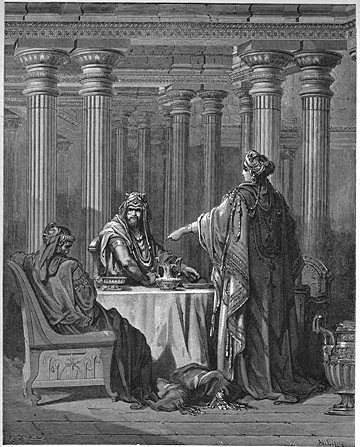Esther 7
1 So the king and Haman went to eat the second banquet/feast that Queen Esther had prepared.
Intravit itaque rex et Aman, ut biberent cum regina.
2 As they were drinking wine, the king asked again, “Esther, what do you want me to do [for you? Tell me, and] I will do it for you. Even if [you ask me for] half of my kingdom, I will give it to you.”
Dixitque ei rex etiam secunda die, postquam vino incaluerat: Quæ est petitio tua, Esther, ut detur tibi? et quid vis fieri? etiam si dimidiam partem regni mei petieris, impetrabis.
3 Esther replied, “O king, if you are pleased with me, and if you are willing to do [what I ask], save me, and save my people. That is what I want you to do for me.
Ad quem illa respondit: Si inveni gratiam in oculis tuis o rex, et si tibi placet, dona mihi animam meam pro qua rogo, et populum meum pro quo obsecro.
4 [It is as though] I and my people [are cattle that] have been sold to be slaughtered. [It is as though] we have been sold to people who want to completely destroy us. If we had only been sold to people to become their male and female slaves, I would not say anything, because that would have been a matter too small to bother you, the king.”
Traditi enim sumus ego et populus meus, ut conteramur, jugulemur, et pereamus. Atque utinam in servos et famulas venderemur: esset tolerabile malum, et gemens tacerem: nunc autem hostis noster est, cujus crudelitas redundat in regem.
5 Then King Xerxes asked her, “Who would want to do such a [terrible] thing? Where is he?”
Respondensque rex Assuerus, ait: Quis est iste, et cujus potentiæ, ut hæc audeat facere?
6 Esther replied, “[The man who is] our enemy is this evil man Haman!” Then Haman was terrified as he stood in front of the king and queen.
Dixitque Esther: Hostis et inimicus noster pessimus iste est Aman. Quod ille audiens, illico obstupuit, vultum regis ac reginæ ferre non sustinens.
7 The king became extremely angry. He immediately left his wine and got up and went outside into the palace garden [to decide what to do]. But Haman stayed, in order to plead with Queen Esther that she would spare his life.
Rex autem iratus surrexit, et de loco convivii intravit in hortum arboribus consitum. Aman quoque surrexit ut rogaret Esther reginam pro anima sua: intellexit enim a rege sibi paratum malum.
8 He threw himself down on the couch where Esther was reclining. But at that moment the king returned from the garden to the room where they had been eating. [He saw Haman, and assumed he was preparing to rape Esther]. He exclaimed, “Are you going to rape the queen while she is here with me in my own palace?” As soon as the king said that, some officials covered Haman’s head, [as they did to people who were about to be hanged].
Qui cum reversus esset de horto nemoribus consito, et intrasset convivii locum, reperit Aman super lectulum corruisse in quo jacebat Esther, et ait: Etiam reginam vult opprimere, me præsente, in domo mea. Necdum verbum de ore regis exierat, et statim operuerunt faciem ejus.
9 Then Harbona, one of the king’s personal officials, said, “[Outside, ] near Haman’s house, there is a (gallows/set of poles for hanging someone). It is 75 feet high. Haman made it for Mordecai, the man who spared your life!” The king said, “Hang him on it!”
Dixitque Harbona, unus de eunuchis, qui stabant in ministerio regis: En lignum quod paraverat Mardochæo, qui locutus est pro rege, stat in domo Aman, habens altitudinis quinquaginta cubitos. Cui dixit rex: Appendite eum in eo.
10 So they hanged Haman on the gallows that he had prepared for hanging Mordecai! And then (the king’s anger cooled off/the king was no longer so angry).
Suspensus est itaque Aman in patibulo quod paraverat Mardochæo: et regis ira quievit.





















